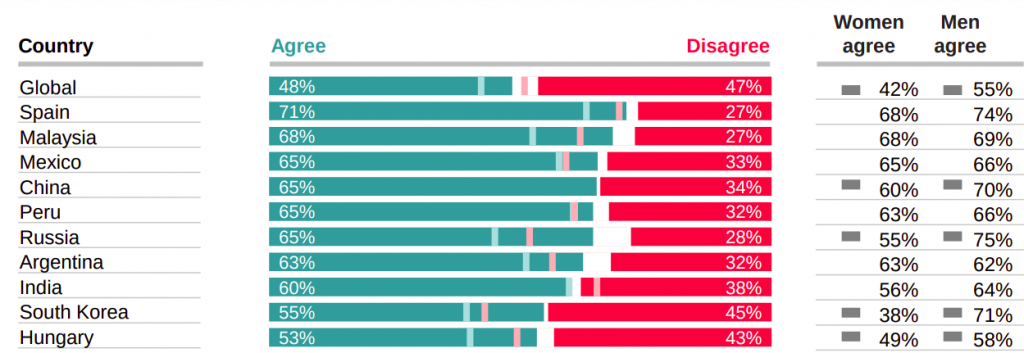A 2020 survey conducted by Ipsos reveals that for a lot of countries around the world, people think there is still a lot of progress needed to make gender equality a reality.
A divide
In their survey, Ipsos interviewed more than 18,000 adults across 26 countries about their global views on acceptable behaviour and equality in the workplace.
In one of their interview items, Ipsos asked the respondents whether or not they agree with the statement: “When it comes to giving women equal rights with men, things have gone far enough in my country.”
The global average shows that there is a divide in opinion on whether or not the country has gone far enough. 48% of the respondents agreed, 47% of the respondents disagreed while the remaining are on the fence.
Dividing the respondents by sex, we can see that 55% of the men agreed but only 42% of the women agreed. Examining the responses this way matters a lot since women are the ones directly experiencing inequalities in their daily lives.
From our partners:
Country Highlights

Let’s further break down the figures by country. Which countries have the biggest shares of respondents agreeing to the statement given by Ipsos?
It turns out that this country is Spain, where 71% of the respondents agree that their country has gone far enough in giving equal rights to women. Breaking this down by sex, 68% of the women agreed to this statement, while 74% of the men agreed.
Spain is followed by Malaysia, where 68% of the respondents agreed. By sex, 68% of the women agreed while 69% of the men agreed.
The United States lags behind the rankings, with only 33% of the respondents agreeing that the US has done enough in giving women equal rights with men. To make things worse, only 27% of the female respondents agreed to the statement versus 38% of men.
On the other end of the extreme, Brazil has the lowest share of respondents agreeing to the statement, with only 30% of respondents overall doing so.
Apart from the agreement rate, the discrepancy between the male and females responses are also of interest.
Malaysia recorded the lowest discrepancy in responses among the male and female agreement rates, only differing by a single percentage point.
Meanwhile, South Korea recorded the highest discrepancy in the rate of agreement between males and females.
While 55% of the South Korean respondents agreed overall, only 38% of the women agreed while 71% of the men agreed, meaning there is a 33-percentage point difference. This means that the relatively high overall agreement rate was only pulled by the rather inflated agreement rate of male respondents.
The fight continues
Women’s History Month may be coming to an end but that doesn’t mean that the fight for gender equality will end as well.
Apart from laying down the necessary regulatory framework to ensure that women will experience equal rights with men, there is, of course, a need to effectively implement this framework so that the people can feel these measures truly being in place.













